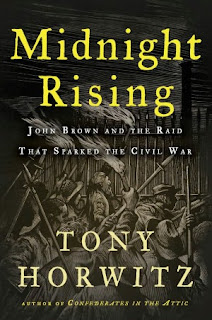 "Harpers Ferry and Lincoln's assassination became bookends to the great national bloodletting over slavery."
"Harpers Ferry and Lincoln's assassination became bookends to the great national bloodletting over slavery." Tony Horwitz, Midnight Rising
John Brown is one of those polarizing figures in American history. Some people see him as a hero, a martyr for a righteous cause. Other see him as a fanatic, who was deservedly hanged for his terroristic actions. I can sympathize with both sides, and am not altogether sure that both can't be correct.
As someone who studied history in college, I am no stranger to the use of sub- or extended titles. I had one professor who routinely referred to the title of a work as "the contract with the reader." While I didn't care for that professor, I did like this definition. Tony Horwitz does not breach his contract with Midnight Rising: John Brown and the Raid that Sparked the Civil War. In this book, Horwitz does two things: 1) he illuminates the often murky historical figure John Brown and 2) he makes the argument that John Brown's raid on Harpers Ferry pushed the United States into civil war.
I had read Horwitz's Confederates in the Attic a few years back, so I thought I knew what type of book I was getting into. In Confederates and other previous works of his, Horwitz weaved past and present, not all that dissimilar to Sarah Vowell's style. Midnight Rising, however, proved to be different. This book stays rooted in the 19th century, with occasion dips into the early 20th century in the final chapters.
Drawing from primary sources and building on the existing scholarship on John Brown, Horwitz fleshes out the boney figure of John Brown. He provides insights into Brown's childhood and life as a young adult, insights that hint at the man that is to come.
Horwitz directly connects Brown with leading figures of that time, including Herman Melville, Ralph Waldo Emerson, Frederick Douglass, Robert E. Lee, John Wilkes Booth, and many others. Establishing that John Brown was well known bolsters Horwitz argument that the Harpers Ferry Raid sparked the Civil War. The raid forced many abolitionist to make a choice: whether to publicly distance themselves from Brown and his men or to side with Brown and his violent defense of freedom for all.
Futhermore, Horwitz shows how the Harpers Ferry Raid quickly became an integral part to the national debate over slavery. The new congress, which had convened just three days after Brown's hanging, found itself starkly divided over slavery, with Harper Ferry getting mentioned often on the floor of the House and the Senate. Henry Wise, governor of Virginia during Brown's Raid, devised a secret plan to take Harpers Ferry for the Confederacy before Virginia had official seceded from the Union. Following his Emancipation Proclamation, Lincoln looked to Brown's attack as a model. He proposed organizing a band of black scouts "whose business should be somewhat after the original plan of John Brown."
I enjoyed learning more about the men who joined John Brown is his raid on Harpers Ferry, who came from all sorts of backgrounds and brought with them many different ideas for how to end the institution of slavery.
Horwitz has produced a well researched and exceptionally readable book about one of the more enigmatic figures in American history. Well worth the read.

No comments:
Post a Comment